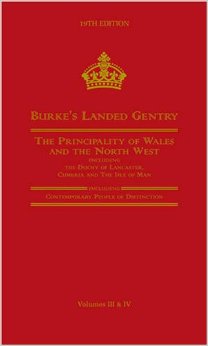Burke's Landed Gentry

Burke’s Landed Gentry: The Principality of Wales and The North West (2006)
|
|
| Edited by | John Burke (first) |
|---|---|
| Country | United Kingdom |
| Genre | Nobility, heraldry, genealogy |
| Publisher | John Burke family et al. |
| Published | 1826 (first edition) |
Burke's Landed Gentry (originally titled Burke's Commoners) is the result of nearly two centuries' intense work by the Burke family and others since, in building a collection of authoritative books on genealogy and heraldry, which has evolved alongside Burke's Peerage, Baronetage & Knightage.
Burke's Landed Gentry provides a detailed listing of families once holding or who continue to own large estates of land and, historically at least, were often in positions of influence and power in regional administration such as High Sheriff, JP, DL or MP for their county.
Burke's Landed Gentry's original purpose, the genealogical record of landed gentry families, became obsolete in the 21st century, whereas the continued hereditary element in the British House of Lords maintains political as well as social interest in reliable public records of the succession to peerage titles, not least because the holders and their heirs retain privileged access to becoming parliamentary legislators. Since the Stuart period, important British families ineligible for peerage publications, such as baronets, were included in later aristocracy books such as "Burke's" and "Debrett's" by virtue of their hereditary title.
The gentry of England and Wales played a pivotal role in regional administration for several centuries while a largely un-centralised system of national government prevailed. From mediaeval times, Knights of the Shire (later Members of Parliament) generally came from landed families in each county, and fulfilled these roles on an almost rotational basis from session to session – not as a parliamentary career – but as an occasional duty expected of their status. Such families generally inter-married strictly within their own counties, thus creating an administrative class in each county closely bonded by familial ties. In English and Welsh feudal society a man's social status was dependent on both the extent of his landholding and by the status of his overlord: those holding land directly from the king were the tenants-in-chief, a group of exalted status. Tenants-in-chief proved to be the monarch's most reliable administrators in the shires because they owed the king personal allegiance and military service as his feudal tenants. Originally they were selected by King William the Conqueror (1066–1087) for their military prowess and reliability as commanders, fellow-conquerors and administrators of his new kingdom of England, and were awarded estates for their further support. However over time, and despite careful "good-breeding", the martial qualities of their progeny may have degenerated by natural process from those of the founders of their House, yet they still inherited the high social status and military obligations of tenants-in-chief. They thus derived their status no longer from personal qualities, but purely from the land they held, and thus the ownership and succession to their estate was of particular importance.
...
Wikipedia
